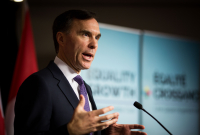Support strong Canadian climate journalism for 2025
Angry civil servants protested the Phoenix pay system debacle outside a federal Liberal cabinet retreat Thursday as the Trudeau government declared it would soon be taking an "entirely different approach" to how its employees get paid.
In a statement released as protesters gathered outside the Liberal retreat in Nanaimo, B.C., the Treasury Board Secretariat said it would seek out potential alternative pay systems through a procurement process it will launch to replace Phoenix.
The government has already been looking at a number of software providers and will work with civil servants and their unions in testing and ultimately launching a replacement human resources and pay system, the statement said.
"The TBS team has been working on preliminary analysis of available vendors and, as part of an upcoming notice of proposed procurement, will be looking to private sector expertise to identify potential innovative alternatives for a new system."
The government said it would be working closely with public servants and unions to assess and ultimately implement a new system.
But Public Service Alliance of Canada president Chris Aylward told placard-waving government employees on Vancouver Island that his members have almost run out of patience.
The Liberals could face consequences in next fall's federal election if they don't act more quickly, he warned: "You start showing respect to federal public-sector workers, or you will pay in October of 2019."
The Trudeau government's last budget included $16 million to search for an alternative to Phoenix, which has caused massive headaches for more than half of federal employees who have been overpaid, underpaid or not paid at all.
The Phoenix system, launched more than two years ago, was supposed to save taxpayers money but is currently on track to cost more than $1 billion.
In a report issued earlier this year, auditor general Michael Ferguson blamed the Phoenix debacle on a culture within government of bureaucrats avoiding reporting failures to their supervisors.
Finding an alternative system has been left to a "multi-disciplinary" team at Treasury Board under the direction of the country's chief information officer, Alex Benay.
"The team will take an entirely different approach than the one that led to the implementation of Phoenix, including strong governance and direct accountability," the statement said.
But that team must act fast if the government is to gain back the confidence of its employees, said Debi Daviau, president of the Professional Institute of the Public Service of Canada.
And alternative systems are already readily available within government that hold the potential to be adapted to the entire federal civil service, she added.
"We hope the government will test every viable alternative, including adapting the corporate administrative system currently used at the (Canada Revenue Agency)," Daviau said.
"Our members have already waited for an alternative long enough."
Roughly 55,000 employees at CRA and the Canada Border Services Agency fall under that system, said Daviau, who said it only needs to be adapted to produce paycheques — a process currently being handled by the national pay centre in Miramichi, N.B.





Comments
The only possible explanation for the debacle that is Phoenix is that someone, somehwere was/is protecting this new byword for incompetence. Phoenix spans two different parties in power but, most likely, the top civil servants in charge remain at the helm. Why have not heads rolled? Have the top civil servants not been inconvenienced by the systems failures? Do they not care that they have done more to damage the Canadian Civil Service reputation than any previous cohort? Where the armed services with their "our tank, our airplane" jokes were the butt of Canadian scorn, now the civil service with its ultimate cost-cutting-budget-trimming non-payment of workers is the new benchmark of government stupidity.
And how can you convert data from the Phoenix system to a new system when there must be all sorts of data problems in the current system contributing to or as a result of incorrect payments or payments not made by the current system? Someone had better figure this out before any conversion to a new system. It is absolutely unconscionable that no heads rolled over this whole fiasco! I was in IT all my life and if their is one system you don’t screw up it is payroll.